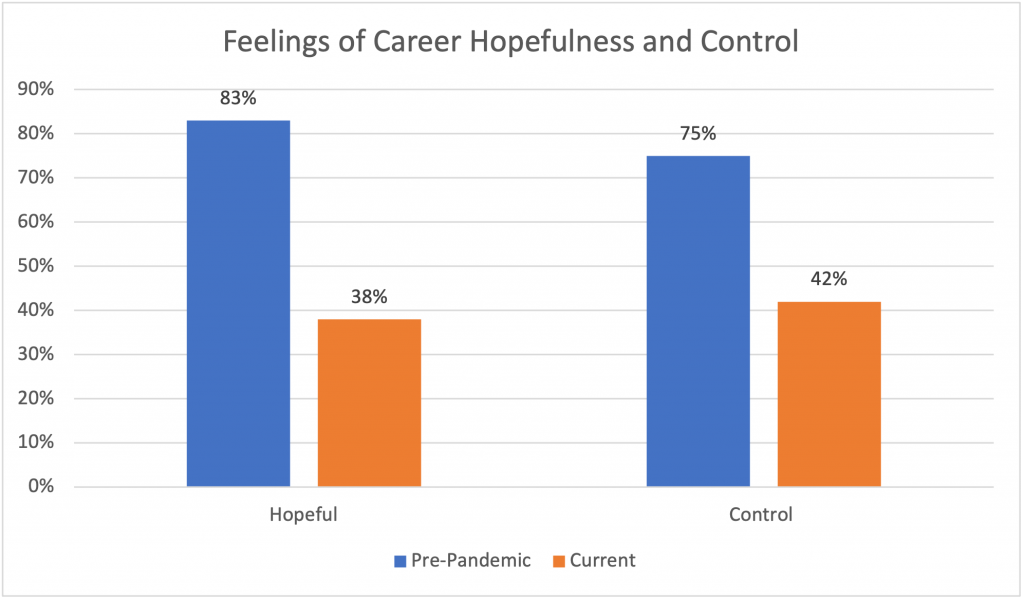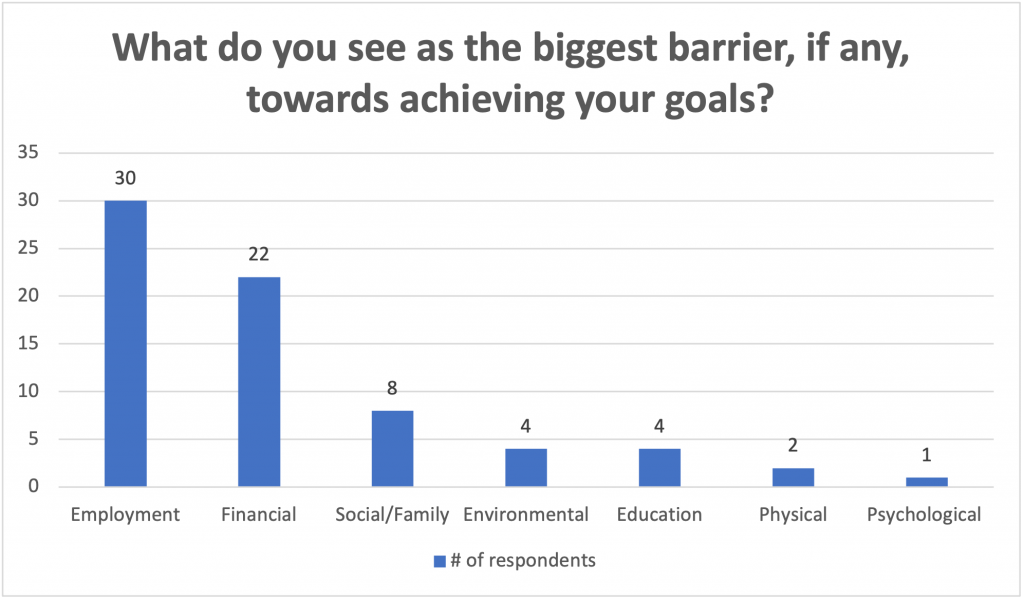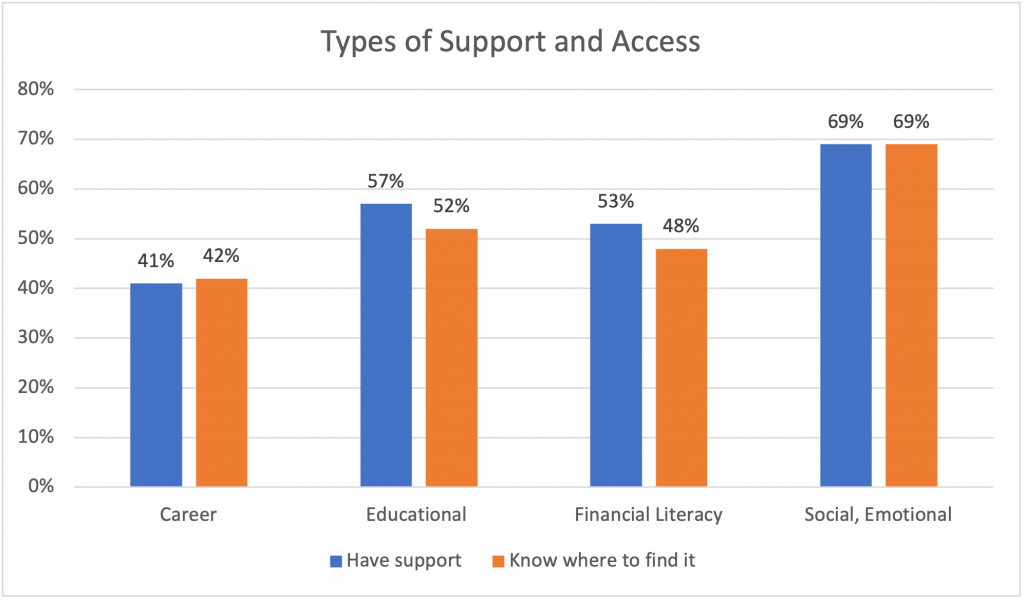
Career development helps people and organizations thrive
June 22, 2021
Justifying personal breaks in a professional context
June 22, 2021Survey examines how Kwantlen Polytechnic University grads are navigating work, education and life disruptions
Candy Ho and John Grant

Statistics Canada (2020) has reported on disruptions students faced as a result of the pandemic. For students who expected to graduate in 2020, 54% expressed major concerns that their credentials may not be deemed equivalent. There is also much discussion around students’ concerns about graduating into what many deem an economic depression.
As a career practitioner in a post-secondary environment (Candy Ho) and an expert in alumni relations (John Grant), we were keen to explore how the class of 2020 has been affected by these unprecedented circumstances. Are the crises as bad as news headlines lead us to believe? Are these young professionals demonstrating resilience and adaptability? How can our institutions best support these graduates? Ho initiated a study to explore these questions.
The study was conducted in November 2020 as an online anonymous survey with 2020 Faculty of Arts graduates at Kwantlen Polytechnic University in British Columbia. It was distributed to 357 graduates, of which 59 (17%) responded in full.
The survey was designed using Nancy Schlossberg’s 4S Transition Theory model (1981; 2011) and thus touched upon four core areas of exploration: self, situation, support and strategies. Here’s what we discovered.
Read more from Careering
How career exploration affects admission and scholarship success
Career competencies and skills translation: Helping students prepare for the future of work
Client Side: Grade 12 was tough enough. Then the pandemic hit
Self: How has the pandemic affected graduates’ level of confidence in their post-university lives?
The pandemic has had a major impact on both the confidence that class of 2020 graduates have in themselves and in their future career or academic prospects.
Before COVID-19, 83% of respondents felt hopeful about their post-university transition. Many were looking forward to jobs, volunteer opportunities or further education, or were already gainfully employed. However, this number plummeted to only 38%, a 45-point drop, as graduates entered the seventh month of the pandemic.
Prior to the pandemic, 75% felt that they had control over their career success, whereas during the pandemic, this number fell to only 42% of respondents. Many new graduates felt lost, alone and stuck in their pursuits:
“I have been forced to take two jobs that I had planned to stop doing as I wanted to start pursuing my career in criminology but this pandemic has left me where I am. I feel like I am not growing, but rather stuck.”
Situation: How does the pandemic impact and influence students’ post-graduation goals and plans?
“I was laid off while in pursuit of full-time work, as well as let go from volunteering both due to the shutdown. [I] have struggled to find new work and had to return to a previous job (not in my field) in order to make ends meet.”
The majority (80%) of respondents expressed that they were required to make adjustments to their short- and long-term goals due to the pandemic: taking lower-paying jobs, the first job offer available or a job unrelated to their studies. Others mentioned remaining in a part-time job or with a current employer when they were initially planning to exit, or even becoming self-employed.
Several indicated that finding a job has become more competitive, as more experienced workers who have lost their jobs are now competing for similar roles. For those planning to pursue further studies, they cited a significant delay in their plans as they were no longer able to travel and/or not willing to complete their studies in an online capacity.
Students identified a lack of employment opportunities and financial instability as the biggest barriers they face in achieving their goals.
Support: What resources or supports do they have from their network? What is missing for them that they might need (e.g. professional mentorship) and how do they go about obtaining these resources?
Respondents most frequently cited social and emotional support such as family, friends or colleagues. Less than half did not feel supported in their career development and also do not know where to find such support.
We asked if there was one thing that post-secondary institutions could do to support their successful transition. Interestingly, students identified career services and programming that are generally considered standard offerings by most institutions, highlighting an opportunity for career services to better promote their programs:
- Promoting career and job opportunities – tailored content for alumni
- Seminars on job application writing and interviews
- Help with graduate school applications
- Online job fair and networking opportunities
- Lobbying to government for further support for recent graduates
- Financial and counselling support for graduates
Social capital also remains important (having friends and family), but what remains unclear is if recent graduates are leveraging these relationships for career support.
“My parents have been the biggest help for me financially, and my boyfriend emotionally. I never asked for any kind of help outside of my friends group, I just never did. I’m not used to asking for help I guess.”
Strategies: How can the pandemic experience be leveraged to adjust or strengthen their post-graduation goals and trajectory?
“I do see the upheaval of 2020 as an opportunity to innovate long-standing systems which have become stagnant for a very long time. Change is good.”
Despite challenges experienced, we were curious if our respondents could reflect upon the pandemic as an opportunity to adjust or perhaps even strengthen their professional trajectory and overall transition. What we discovered is that many found value in spending more time with their loved ones, or considered new paths that may not otherwise have transpired due to happenstance.
“I would not have applied for graduate school if the pandemic didn’t happen.”
Conclusion
With the completion of our first phase, we will conduct another survey to determine how these graduates have adjusted since fall 2020 and to explore more themes in detail through focus groups. We speculate that these transition issues are not new – every class of graduates discovers unexpected challenges; however, we suspect that these issues are more pronounced due to the pandemic.
This study emphasizes the need to help graduates develop a career mindset early on – not just when they are about to graduate. Shifting to a lifelong career management approach can distribute the access to and awareness of support throughout a student’s academic journey and beyond. We are keen to continue learning from our participants, and to generate recommendations for institutions to better help students and alumni conceptualize their career development process as a canoe: moving and shifting with the ebb and flow of life and transitions.
Dr. Candy Ho is honoured to serve as Vice-Chair of CERIC. She is the inaugural Assistant Professor, Integrative Career and Capstone Learning in the University of the Fraser Valley in British Columbia, Canada. She also holds teaching positions in Kwantlen Polytechnic University’s Educational Studies department and in Douglas College’s Career Development Practitioner Program.
John Grant is a lecturer in Applied Communications, School of Business at Kwantlen Polytechnic University and a visiting lecturer with Simon Fraser University’s Beedie School of Business. His background is in higher education administration, the majority of which was spent in alumni relations. Grant also holds an MEd in Post-Secondary Leadership from Simon Fraser University.
References
Schlossberg, N. K. (1981). A model for analyzing human adaptation to transition. The Counseling Psychologist, 9(2), 2-18. doi: 10.1177/001100008100900202
Schlossberg, N. K. (2011). The challenge of change: The transition model and its applications. Journal of Employment Counseling, 48, 159-162. doi: 10.1002/j.2161-1920.2011.tb01102.x
Statistics Canada. (2020). COVID-19 Pandemic: Academic impacts on postsecondary students in Canada. https://www150.statcan.gc.ca/n1/pub/45-28-0001/2020001/article/00015-eng.htm




